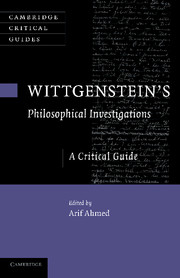Book contents
- Frontmatter
- Contents
- List of contributors
- Acknowledgments
- Introduction
- 1 From referentialism to human action: the Augustinian theory of language
- 2 What's doing? Activity, naming and Wittgenstein's response to Augustine
- 3 Measure for measure? Wittgenstein on language-game criteria and the Paris standard metre bar
- 4 Wittgenstein on family resemblance concepts
- 5 Wittgenstein on concepts
- 6 Wittgenstein vs contextualism
- 7 Wittgenstein and the linguistic turn
- 8 Rorty's Wittgenstein
- 9 Are meaning, understanding, etc. definite states?
- 10 Another strand in the private language argument
- 11 Deductive inference and aspect perception
- 12 Remembering intentions
- Bibliography
- Index
12 - Remembering intentions
Published online by Cambridge University Press: 06 July 2010
- Frontmatter
- Contents
- List of contributors
- Acknowledgments
- Introduction
- 1 From referentialism to human action: the Augustinian theory of language
- 2 What's doing? Activity, naming and Wittgenstein's response to Augustine
- 3 Measure for measure? Wittgenstein on language-game criteria and the Paris standard metre bar
- 4 Wittgenstein on family resemblance concepts
- 5 Wittgenstein on concepts
- 6 Wittgenstein vs contextualism
- 7 Wittgenstein and the linguistic turn
- 8 Rorty's Wittgenstein
- 9 Are meaning, understanding, etc. definite states?
- 10 Another strand in the private language argument
- 11 Deductive inference and aspect perception
- 12 Remembering intentions
- Bibliography
- Index
Summary
Philosophical Investigations 633–93 contains a striking discussion of our capacity to remember our earlier intentions, wishes and emotions, and to remember how we meant an earlier word or remark. Wittgenstein writes:
633. “You were interrupted a while ago; do you still know what you were going to say?” – If I do know now, and say it – does that mean that I had already thought it before, only not said it? No. Unless you take the certainty with which I continue the interrupted sentence as a criterion of the thought's already having been completed at that time. – But, of course, the situation and the thoughts which I had contained all sorts of things to help the continuation of the sentence.
634. When I continue the interrupted sentence and say that this was how I had been going to continue it, this is like following out a line of thought from brief notes.
Then don't I interpret the notes? Was only one continuation possible in these circumstances? Of course not. But I did not choose between interpretations. I remembered that I was going to say this.
635. “I was going to say…” – You remember various details. But not even all of them together show your intention. It is as if a snapshot of a scene had been taken, but only a few scattered details of it were to be seen: here a hand, there a bit of a face, or a hat – the rest is dark. And now it is as if we knew quite certainly what the whole picture represented.[…]
Keywords
- Type
- Chapter
- Information
- Wittgenstein's Philosophical InvestigationsA Critical Guide, pp. 218 - 234Publisher: Cambridge University PressPrint publication year: 2010

